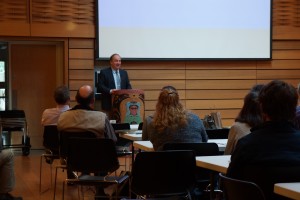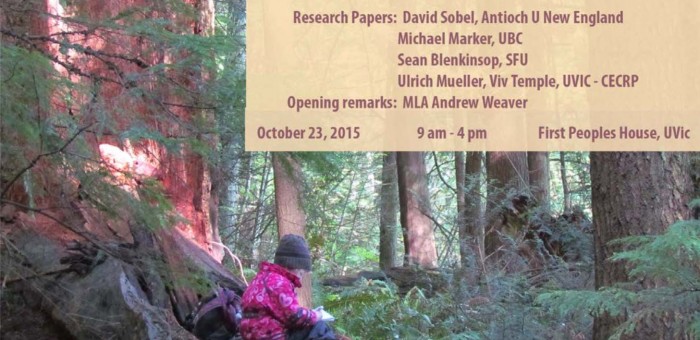The Wonders of Nature Research Day
Today I was afforded the honour of delivering the opening the opening remarks at the Wonders of Nature Research Day put on by UVic’s Centre for Early Childhood Research and Policy. The research days featured presentations by a number of distinguished scholars including:
- David Sobel, Department of Education, Antioch University, New England
- Michael Marker, Department of Educational Studies, University of British Columbia
- Sean Blenkinsop, Faculty of Education, Simon Fraser University
- Ulrich Mueller, Department of Psychology, University of Victoria
- Viv Temple, School of Exercise Science, Physical and Health Education, University of Victoria
- Enid Elliott, School of Health and Human Services, University of Victoria
Below is the text of my opening remarks.
Text of Opening Remarks
 I would like to start off by thanking Beverley and everyone at the Centre for Early Childhood Research and Policy for inviting me here today and for organizing this wonderful conference. As Beverley pointed out, my name is Andrew Weaver and I’m the Member of the Legislative Assembly representing the riding of Oak Bay-Gordon Head — home to the University of Victoria.
I would like to start off by thanking Beverley and everyone at the Centre for Early Childhood Research and Policy for inviting me here today and for organizing this wonderful conference. As Beverley pointed out, my name is Andrew Weaver and I’m the Member of the Legislative Assembly representing the riding of Oak Bay-Gordon Head — home to the University of Victoria.
I have been in the Legislature for about two and a half years now, but before that I actually worked right here at UVic as a Faculty Member in the School of Earth and Ocean Sciences. In parallel with my endeavours in research, I’ve spent a good deal of time engaging the public in discussions about the importance of nature and our environment, and the detrimental path we are headed down if we don’t take action to reduce ongoing loading of the atmosphere with greenhouse gases that are causing global warming.
While it is easy to become disillusioned and worn out working in the field of climate science — seeing the path we’re headed down and fighting an uphill battle to try and make governments and policy makers see it too — it is our children and youth that inspire me — give me hope for the future — and keep me optimistic after so many years in this field.
In fact, one of my favourite parts about my role as MLA, is being able to go into schools and universities and speak to children and youth about our environment and the importance of civic engagement. Seeing their keen interest and appreciation for our natural environment and their desire to make our world a sustainable place is truly what inspires me in my daily work down in the legislature.
Because of this, I was very honoured when I was asked to provide opening remarks here today — I’m just disappointed I won’t be able to stick around to learn about the fantastic research that is being done in this area.
I was actually fortunate enough to experience a nature school program first-hand about a year and a half ago. I was invited by Savory Elementary School to be an “Eco Expert” for their “4 Seasons Eco School”. The program, which I believe was in its inaugural year when I visited, ran each Wednesday and provided all students with the opportunity to learn outside in Savory’s surrounding ecosystem, bringing in a new guest expert each week to guide the children.
I got to spend an entire day, from 8:30 in the morning to 2:30 in the afternoon, delivering a lesson plan to seven separate classes and engaging with every grade from Kindergarten to grade 6. To say that I was exhausted by the end of it would be an understatement, but it was also a truly unforgettable and inspiring experience — and helped to further my respect and appreciation for our teachers who do far more than I did, but on a daily basis.
Over the last decade as a scientist I’ve also had the privilege of working with school districts across Vancouver Island to install more than 150 weather stations on schools (Islandweather.ca for those who are interested), and to develop learning resources, in collaboration with teachers, to allow them to deliver their curriculum using state-of the art instrumentation and an authentic learning experience. Getting out of the ivory tower and into the community to discuss science, weather and our natural environment has been — to be perfectly frank — the single most satisfying and rewarding experience I have had as a scientist.
In today’s technology driven world, where young children are spending as much as eight hours a day interacting with screens — and often less than an hour a day actually outside – I firmly believe that providing children with the opportunity to experience “the wonders of nature” is one of the most important things we can do to help foster their development. While I am by no means an expert in the topic — you will hear from them later — I do know that there is a vast amount of research to demonstrate just how important time spent outdoors is to early development. Studies have shown that children who interact with nature on a daily basis are healthier, happier, more creative and less stressed than those who don’t.
And these benefits are not only felt in childhood. Researchers continue to develop a better understanding of the lasting impacts that early childhood experiences can have on our lives. Whether we remember the experience or not, and whether we are aware of magnitude of those experiences or not, they can stick with us throughout our entire lives. We carry them with us through our adolescent and teen years, into young adulthood and beyond. Developing an understanding and appreciation of nature at an early age will have a lasting effect on children.
And these benefits will not just be felt by the children fortunate enough to experience this type of learning environment. They will be felt by their peers, their families, their communities, and society as a whole. They will impact the way they interact with other people, the way that they view and interact with their environments — both built and natural, and the way that they engage in their future careers.
In a few decades, the children that we’re talking about today will be our teachers, our researchers, our scientists, our policy makers, and our government leaders. They will be making the decisions that influence our society, implementing the policies that protect our environment, and educating an entire future generation of children on the importance of our natural world. So the fact that you are all here today, discussing such an important initiative, is a truly inspiring sight to see!
Thank you again for having me here to speak today and enjoy the rest of the conference!
Comments are closed.




